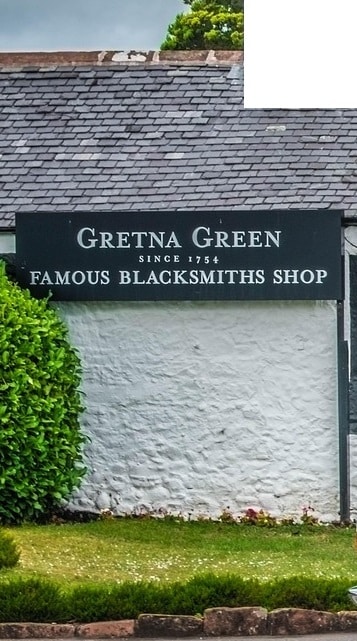Utah: A Virtual Gretna Green?
July 15, 2025

In Jane Austen’s novel, Pride and Prejudice, Lydia Bennet plans to elope to the village of Gretna Green, Scotland with Mr. Wickham. As she explains in a letter:
You will laugh when you know where I am gone, and I cannot help laughing myself at your surprise tomorrow morning, as soon as I am missed. I am going to Gretna Green, and if you cannot guess with who, I shall think you a simpleton, for there is but one man in the world I love, and he is an angel.
Spoiler alert: Mr. Wickham is not an angel. And they never do make it to Gretna Green. Countless other young English couples did, however, marry in Gretna Green over the course of the eighteenth and nineteenth centuries. The Wikipedia entry for the village provides a concise overview of its appeal:
In 1753 . . . an Act of Parliament . . . was passed in England, which provided that consent to the marriage had to be given by the parents if both parties were not at least 21 years old. This Act did not apply in Scotland, which allowed boys to marry at 14 and girls at 12, with or without parental consent. . . As a result, many elopers fled England, and the first Scottish village they reached was often Gretna Green.
Because Lydia was only sixteen at the time she wished to marry Wickham, and because her parents would never have allowed the match, they could not marry in England. If they married in Scotland, however, England would recognize the marriage when they returned home. To frame the issue in modern terms, England had a public policy objection to allowing parties under twenty-one to marry without parental consent, but this public policy objection was not so fundamental that England would refuse to recognize such marriages when performed in Scotland.
I thought of Gretna Green while reading this fascinating blog post by Béligh Elbalti, a law professor at the University of Osaka. That post, titled The Validity of the Utah Zoom Wedding in Lebanon, or the Question of Locus Celebrationis in the Digital Age, tells the story of a modern Lebanese couple facing the same problem at Lydia and Wickham. They wished to marry. They were unable to marry in Lebanon, however, because only religious marriages are permitted under Lebanese law. If a couple wants a civil marriage, they must travel to another country, marry, and then ask the Lebanese authorities to recognize the foreign marriage.
The wrinkle in this particular case was that the couple never physically left Lebanon. Instead, they were married—via Zoom—in a virtual ceremony performed by an officiant in Utah. Only a handful of U.S. states (Montana, Texas, and Utah) allow for proxy marriages where one or both individuals are not physically present. And Utah is the only one that doesn’t require at least one of the parties to be a state resident or a member of the U.S. military. So long as a couple living anywhere in the world is eligible to be married under Utah law, they can do so without setting foot in the state.
This only works, of course, if their home country will recognize the Utah marriage after the fact. The courts in Germany, for example, refuse to recognize virtual marriages performed in Utah. Which brings us back to Lebanon and Elbalti’s blog post. After the virtual ceremony discussed was performed, and the Lebanese couple was married as a matter of Utah law, they asked the Lebanese authorities to recognize the marriage. They refused. This decision was, however, overruled by a Lebanese court, which held that the Utah marriage had to be recognized as a matter of Lebanese law:
X and A concluded a civil marriage abroad pursuant to Article 25 of the Legislative Decree No. 60. The fact that they were physically located in Lebanon at the time of celebration does not alter the fact that the locus celebrationis of the marriage was de jure the State of Utah, based on the spouses’ clear, explicit and informed choice of the law of marriage in the State of Utah. Accordingly, the marriage contract at issue in this dispute satisfies the formal requirements of the jurisdiction in which it was concluded (Utah), and must therefore be deemed valid under Article 25 of the Legislative Decree No. 60.
If other countries choose to follow Lebanon’s lead in recognizing virtual proxy marriages performed in Utah, one can easily imagine a world where that state becomes a virtual Gretna Green, a place where couples whose union is forbidden under the law of their home jurisdiction can marry one another without having to physically travel anywhere. Indeed, there are companies that would be happy to facilitate this process for anyone who might be interested.